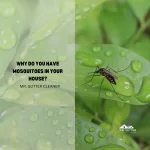Mosquitoes, attracted to homes due to various factors, pose significant challenges in maintaining a comfortable and safe environment. Key attractors include carbon dioxide from human breath, body heat, and specific scents.
Moreover, standing water in places like gutters provides ideal breeding grounds, exacerbating the issue.
Effective home maintenance practices, such as regular gutter cleaning, can mitigate these risks.
By eliminating standing water, homeowners significantly reduce mosquito habitats, addressing the root cause of infestations.
Additionally, incorporating natural repellents and mosquito-proofing measures like screens and nets further protects homes.
Understanding mosquito behavior, including their peak activity times and lifecycle, empowers homeowners to implement targeted strategies.
Professional pest control services offer specialized solutions when infestations become unmanageable.
This comprehensive approach aligns with the central search intent by equipping homeowners with knowledge and tools to diminish mosquito attraction effectively, promoting a healthier living space.
Why Understanding Mosquito Attraction is Crucial for Home Maintenance
Understanding mosquito attraction is pivotal in home maintenance to ensure a safe and comfortable living environment. Mosquitoes are not just nuisances; they are vectors for diseases such as malaria, dengue, and Zika virus, making their management a health priority. The key to effective mosquito control lies in understanding how and why they are attracted to human environments.
Table of Contents:
- Why Understanding Mosquito Attraction is Crucial for Home Maintenance
- Key Factors That Attract Mosquitoes to Your Home
- Environmental Conditions That Increase Mosquito Activity
- Practical Tips to Reduce Mosquito Attraction
- Understanding Mosquito Behavior to Protect Your Home
- Innovative Strategies for Mosquito Management in Home Environments
How Do Mosquitoes Locate Their Targets?
Mosquitoes use a combination of sensory cues to locate their targets. Carbon dioxide (CO2) exhaled by humans is a significant attractant, guiding mosquitoes to their food source from a distance. Additionally, body heat and specific body odors play crucial roles in mosquito attraction, making everyone a potential target but some more than others based on individual scent signatures.
The Role of Water in Mosquito Proliferation
Standing water is the breeding ground for mosquitoes, with females laying their eggs in stagnant or slow-moving water. Gutters, often overlooked in routine home maintenance, can accumulate water and organic debris, creating ideal conditions for mosquito breeding. Regular cleaning and maintenance of gutters are therefore essential in disrupting the mosquito life cycle and reducing their population around the home.
Key Factors That Attract Mosquitoes to Your Home
Understanding the factors that attract mosquitoes is critical in home maintenance, particularly for ensuring the comfort and safety of your living environment. Mosquitoes are attracted to a variety of conditions and substances present around homes, which can significantly increase their presence if not properly managed.
Carbon Dioxide: How Your Breath Draws Mosquitoes
Mosquitoes are drawn to carbon dioxide (CO2), which humans and pets exhale. This gas acts as a signal to mosquitoes that a potential blood meal is near. The more CO2 present in an area, the higher the likelihood of mosquitoes being attracted to it. This fact underscores the importance of ventilation and managing air flow around living spaces to disperse CO2 accumulation.
Body Heat and Sweat: The Warmth That Invites Mosquitoes
Another significant attractor for mosquitoes is body heat and the moisture from sweat. Mosquitoes have sophisticated sensors that allow them to detect warmth and humidity, guiding them to their next meal. Regular cleaning of areas where sweat and body heat are more likely to accumulate can help in reducing their attraction.
Dark Clothing: Does It Really Attract Mosquitoes?
Contrary to popular belief, the color of clothing can also play a role in attracting mosquitoes. Dark colors tend to absorb more heat, making individuals wearing them more visible and appealing to mosquitoes. Opting for lighter-colored attire can be a simple yet effective strategy to make oneself less attractive to these pests.
Floral and Fruity Scents: Are They Attractive to Mosquitoes?
Mosquitoes are also attracted to floral and fruity scents, often found in perfumes, lotions, and other personal care products. These scents mimic the smell of nectar, which mosquitoes find irresistible. Using unscented products or those specifically designed to repel mosquitoes can help in minimizing their attraction to your home.
Environmental Conditions That Increase Mosquito Activity
Environmental conditions play a significant role in attracting mosquitoes to residential areas, impacting home maintenance efforts. By understanding these conditions, homeowners can take proactive steps to reduce mosquito presence and enhance their living environment’s safety and comfort.
Standing Water: The Breeding Grounds for Mosquitoes
Standing water is a primary factor in mosquito proliferation, offering a perfect breeding site. Mosquitoes lay eggs in stagnant water, which can be found in various outdoor locations, including puddles, bird baths, and poorly maintained gutters. Regularly eliminating standing water sources significantly disrupts the mosquito life cycle, reducing their population near homes.
Standing Water in Gutters: Overlooked Risk for Homeowners
Gutters are often overlooked as potential mosquito breeding grounds. When gutters become clogged with debris, they can retain water, creating an ideal environment for mosquitoes to breed. Regular gutter cleaning and maintenance are crucial to prevent water accumulation and minimize the risk of mosquito infestations. This simple yet effective measure is a key aspect of home maintenance that directly impacts mosquito control.
Garden Maintenance: Plants That Attract vs. Repel Mosquitoes
The choice of garden plants can influence mosquito activity around a home. Some plants, due to their fragrance or nectar, may attract mosquitoes, while others are known to have natural mosquito-repellent properties. Incorporating plants like lavender, marigold, and citronella into landscaping can help deter mosquitoes, contributing to a more pleasant outdoor environment.
Outdoor Lighting: Does It Attract Mosquitoes?
Mosquitoes are attracted to certain types of outdoor lighting, especially those emitting blue or ultraviolet light. Switching to mosquito-repellent lights or yellow “bug lights” can reduce the attractiveness of a home to mosquitoes during the evening and night, when they are most active. This adjustment in outdoor lighting strategy is a simple yet effective way to decrease mosquito presence around living spaces.
Practical Tips to Reduce Mosquito Attraction
Reducing mosquito attraction is essential for maintaining a comfortable and safe home environment. Homeowners can adopt several practical measures to minimize the presence of mosquitoes, focusing on proactive steps that deter these pests from becoming a nuisance.
Removing Standing Water: A Step-by-Step Guide
Standing water is a prime breeding ground for mosquitoes. Homeowners should regularly inspect their property for any accumulations of water, particularly after rainfall. This includes checking flowerpots, bird baths, and other garden items. Gutters should be cleaned and maintained to ensure they are free from debris that can block water flow, preventing water from standing.
Clearing Gutters: Preventing Mosquito Havens
Gutters can easily become clogged with leaves, twigs, and other debris, leading to standing water. A clear gutter system is crucial in mosquito prevention. Homeowners should schedule regular gutter cleaning sessions, especially before and after the rainy season, to keep these areas dry and unattractive to mosquitoes.
Natural Repellents: Safe for Home Use
Natural repellents can provide a safe and environmentally friendly way to deter mosquitoes. Planting mosquito-repelling plants such as citronella, lavender, and marigold around your home can naturally keep mosquitoes at bay. Additionally, essential oils like eucalyptus and tea tree oil can be used in diffusers to create a mosquito-repellent atmosphere.
Mosquito-Proofing Your Home: Screens, Nets, and Other Barriers
Physical barriers are an effective method to prevent mosquitoes from entering the home. Installing screens on windows and doors, using mosquito nets over beds, and applying weather stripping to seal gaps can significantly reduce indoor mosquito presence. Ensuring these barriers are intact and free from holes is key to their effectiveness.
Understanding Mosquito Behavior to Protect Your Home
Gaining insight into mosquito behavior is a cornerstone of effective home maintenance, enabling homeowners to adopt proactive strategies for minimizing mosquito presence and the associated risks. This section delves into the lifecycle of mosquitoes, their peak activity hours, and when it might be necessary to seek professional pest control.
The Lifecycle of a Mosquito: Knowing Your Enemy
Mosquitoes go through four life stages: egg, larva, pupa, and adult, with water being crucial for the first three stages. Understanding this cycle highlights the importance of eliminating standing water to disrupt their breeding process. For instance, ensuring gutters are not clogged can prevent water accumulation, thereby reducing potential breeding sites.
Peak Mosquito Hours: When to Stay Indoors
Mosquitoes are most active during dawn and dusk. Knowing their peak activity times allows homeowners to take preventive measures, such as staying indoors during these periods or using protective clothing and repellents when outside. This behavioral insight is vital for scheduling outdoor activities without increasing the risk of mosquito bites.
Professional Pest Control: When to Call in the Experts
While many preventative measures can be undertaken independently, severe infestations may require professional intervention. Experts in pest control can offer targeted solutions, including larvicides for water bodies that cannot be drained and insecticides for adult mosquito control. They can also provide advice on long-term prevention strategies, ensuring homeowners are well-equipped to maintain a mosquito-free environment.
Innovative Strategies for Mosquito Management in Home Environments
Understanding and managing mosquito attraction goes beyond basic maintenance; innovative strategies can further enhance protection against these pests. This section explores advanced techniques and practices that homeowners can implement to fortify their defenses against mosquitoes.
Integrating Smart Home Technologies for Mosquito Control
Advancements in smart home technology offer new avenues for mosquito management. Automated mosquito repellent systems, smart traps, and even landscaping lighting designed to deter mosquitoes can be integrated into home automation systems. These technologies provide both convenience and effectiveness, allowing for scheduled repellent dissemination or trap activation during peak mosquito activity hours.
Biocontrol Methods: Leveraging Natural Predators
Biocontrol introduces natural predators of mosquitoes into the environment, such as certain fish species in ponds that consume mosquito larvae or encouraging the presence of dragonflies. This method is a sustainable and eco-friendly option that reduces mosquito populations without the use of chemicals.
Landscaping with Mosquito-Repelling Plants
In addition to traditional repellent plants, recent research has identified more species that have mosquito-repelling properties. Strategic landscaping with these plants can create a natural barrier against mosquitoes, reducing their presence in outdoor living spaces. Homeowners can consult with local gardening experts to identify the best plants for their area.
Community-Wide Mosquito Management Programs
Participation in or initiation of community-wide mosquito management programs can amplify individual efforts. These programs often involve coordinated actions like area-wide spraying, larvicide treatments in public waters, and education campaigns on preventing mosquito breeding. Collaborative community efforts are highly effective in reducing mosquito populations in a given area.


